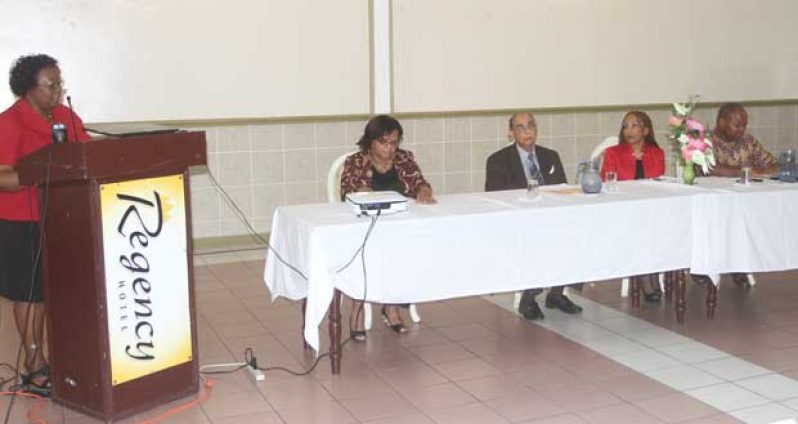CARNEGIE School of Home Economics hosted a one-day workshop yesterday, entitled ‘Creating the Winning Team’.
It was themed ‘21st Century Strategies for Success in the Tourism and Hospitality Industry’ and attracted stakeholders from the tourist, hotel and restaurant industry at Regency Suites, in Hadfield Street, Georgetown.

The aim was to expose participants to relevant up-to-date cutting-edge practices so necessary in today’s highly globalised and competitive environment.
In her welcome and opening remarks, Carnegie Principal, Ms. Penelope Harris told the gathering that this year marks 81 years for the school, and the workshop has grown out of the pressing need to meet the skills gap in the tourism and hospitality sector.
She said they have received calls in the office, weekly, from the business community and private individuals seeking trained personnel or training for their staff.
“It is our desire to meet the needs of the community and, therefore, expansion and diversification of our mode is very necessary. We aim to provide quality training in those courses which are in demand,” Harris assured.
She pointed out that Carnegie offers courses in Front Desk Management, Housekeeping, Resort and Hospitality Management and Health and Social Care.
Harris announced that, in May, they will be hosting a workshop on breadfruit products, sponsored by the United Nations (UN) Food and Agricultural Organisation (FAO) and a similar seminar on food presentation skills will take place later in the year.
Chairman of the Carnegie Board, Mr. John Seeram said the objective of yesterday’s forum was to focus on the ‘how’ rather than the ‘what’ is offered in the industry.
RAPID GROWTH
He observed that there has been rapid growth and development in the hospitality and tourism sector and Carnegie has made a significant contribution in the area of technical and vocational education delivery.
Seeram said the school conducts certificate and diploma programmes in hotel and tourism operations and management and has an internship programme with hotels as part of its training scheme.
He stated that quality in the hospitality and tourism sector involves constant delivery of products and guest services according to acceptable standards and delivering that quality is an essential condition for success in any emerging and keenly competitive tourism market and, in that regard, Guyana is no exception.
Acting Chief Education Officer (Technical), Mr. Patrick Chinedu, in his remarks, praised the Carnegie workshop which, he said, fits into the Ministry of Education’s holistic plan for Technical Vocational Education and Training (TVET) that responds to the workforce needs of the 21st century Guyanese economy.
He stated that the ministry has revamped the mode of technical education deliverance which, when fully operational, will proactively be addressing the workforce needs and development of the current Guyana and beyond.
Chinedu said that, last year, the TVET Council concluded the first labour market information survey, a tool that will provide intelligence for use by the institutions for strategic skills planning and delivery.
He noted that these initiatives have opened the doors for a more serious engagement and dialogue between the training providers and employers.
EMPLOYERS COMPLAIN
Chinedu admitted that, often times, employers complain of not been provided with the relevant skills that match their labour force, noting that the need for constant dialogue, training and retraining of employees cannot be over emphasised.
He said: “It is unfortunate, however, that some of our employers have not bought into or understood the benefits to ensure that their employees are equipped with the relevant and updated skills training.”
Chinedu added that the Education Ministry intends to change this by forcefully embarking on a campaign of industry training provider linkages, because the need for training and retraining is even more evident in our global village where every major activity or job is Information Communication Technology (ICT) related.
Yesterday’s exercise was facilitated by Ms. Phillipa Morris, President of Etiquette Training International, of New York, in the United States.
Some of the areas covered during the one-day agenda include rebranding/retooling; overcoming challenges, promoting the new vision internally and externally, 21st century front line training, body language skills, a new tool in hospitality, promoting ‘the team’ versus ‘the group’, hospitality language-breaking the barrier, conflict management and fine dining, among others.
(By Michel Outridge)



.jpg)








